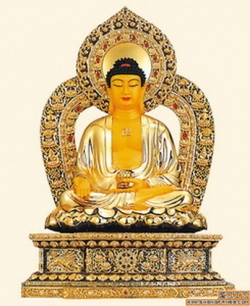Difference between revisions of "Nembutsu"
Jump to navigation
Jump to search
(Created page with "thumb|250px| Definition: Nembutsu is the Japanese name of the chant that is the central practice of Pure Land Buddhism. In Chinese, this chant is "Na-mu A-...") |
|||
| Line 1: | Line 1: | ||
[[File:Url242.jpg|thumb|250px|]] | [[File:Url242.jpg|thumb|250px|]] | ||
| − | Definition: Nembutsu is the Japanese name of the chant that is the central practice of Pure Land Buddhism. In Chinese, this chant is "Na-mu A-mi-to Fo" (Hail, Amitabha Buddha). The same chant in Japanese is "Namu Amida Butsu." Amitabha Buddha is the Buddha of Sukhavati, | + | Definition: Nembutsu is the Japanese name of the chant that is the central practice of [[Pure Land Buddhism]]. In Chinese, this chant is "Na-mu A-mi-to Fo" (Hail, Amitabha Buddha). The same chant in Japanese is "Namu Amida Butsu." Amitabha Buddha is the Buddha of Sukhavati, [[The Western Paradise]], also called the [[Pure land]]. [[Pure land]] Buddhists chant Amitabha's name to be reborn in the [[Pure land]], which brings one closer to [[Nirvana]]. |
{{R}} | {{R}} | ||
| + | [http://buddhism.about.com/od/buddhismglossaryn/g/Nembutsu.htm buddhism.about.com] | ||
[[Category:Pure Land]] | [[Category:Pure Land]] | ||
| − | + | [[Category:Buddhist Terms]] | |
| − | [[Category: | ||
Revision as of 09:21, 5 February 2013
Definition: Nembutsu is the Japanese name of the chant that is the central practice of Pure Land Buddhism. In Chinese, this chant is "Na-mu A-mi-to Fo" (Hail, Amitabha Buddha). The same chant in Japanese is "Namu Amida Butsu." Amitabha Buddha is the Buddha of Sukhavati, The Western Paradise, also called the Pure land. Pure land Buddhists chant Amitabha's name to be reborn in the Pure land, which brings one closer to Nirvana.
